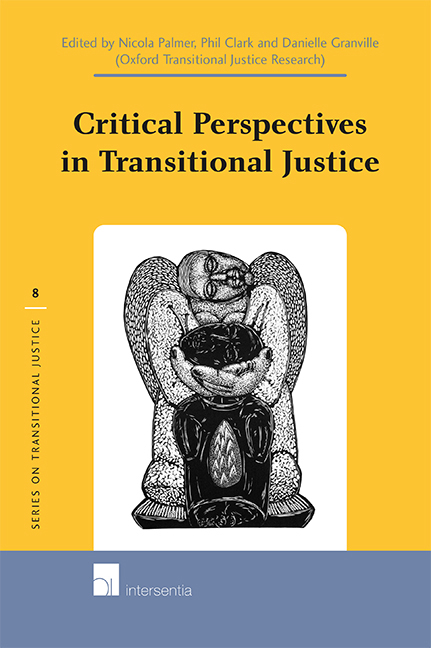Book contents
- Frontmatter
- Note
- Acknowledgements
- Contents
- Abbreviations
- Introduction
- Section 1 Critiquing Core Concepts in Transitional Justice
- Section 2 Accountability, Human Rights and the Rule of Law
- Section 3 Locality and Legitimacy
- Section 4 Memory, Ritual and Apology
- Section 5 Transitional Justice After Transition
- Contributors’ Biographies
- Series on Transitional Justice
15 - The Elusive Quest for Reconciliation in Northern Uganda
Published online by Cambridge University Press: 22 December 2020
- Frontmatter
- Note
- Acknowledgements
- Contents
- Abbreviations
- Introduction
- Section 1 Critiquing Core Concepts in Transitional Justice
- Section 2 Accountability, Human Rights and the Rule of Law
- Section 3 Locality and Legitimacy
- Section 4 Memory, Ritual and Apology
- Section 5 Transitional Justice After Transition
- Contributors’ Biographies
- Series on Transitional Justice
Summary
INTRODUCTION
Achieving justice and societal reconciliation in the aftermath of prolonged civil war is an improbable task for which there are no ready solutions. In northern Uganda, a region wracked by decades of fighting between the Government of Uganda and the Lord's Resistance Army (LRA), the quest for justice and reconciliation has been both passionate and elusive.
Conflict theorists frequently describe reconciliation as a part of any comprehensive peace process, but in most cases the various dimensions of rebuilding or restoring relations are described as goals to be pursued after the fighting has ended. However, a striking aspect of the discourse about reconciliation in northern Uganda is the extent to which Ugandans have called for reconciliation even before a peace agreement was developed. This has been true of local NGOs that emerged to address the consequences of war, certain elected officials, and some Ugandan academics.
The language of reconciliation in turn figured prominently in the ‘Agreement on Accountability and Reconciliation’ that was reached at the Juba peace talks (2006–2008) by negotiators for the Ugandan government and the LRA. In this document, the negotiators agreed that ‘collective and individual acts and processes of reconciliation shall be promoted at all levels.’ This Agreement also endorsed the use of traditional justice practices such as the Acholi mato oput as part of a framework for achieving post-conflict justice.
Another notable phenomenon in northern Uganda is that consistent calls for reconciliation have come from people who have been most affected by the violence: individuals whose family members were killed in the war, parents whose children were abducted, teachers and headmasters whose schools were disrupted. The Concerned Parents Association (CPA), for example, is the largest ‘victims’ organisation’ in the region. CPA formed in 1996 after the LRA abducted over one hundred girls from a secondary school in Aboke. It grew to include thousands of war-affected parents organized in several hundred ‘parent support groups.’ From its founding, CPA advocated for negotiations to end the war, and for reconciliation with those who had committed atrocities.
These calls for reconciliation should not be construed as reflecting a unanimous view or cultural consensus; surveys and interviews in northern Uganda reflect a large number of victimised people who favor retributive responses to the crimes committed, but the persistence of calls for reconciliation among a variety of actors, which occurred even at the height of the violence, is nevertheless striking.
- Type
- Chapter
- Information
- Critical Perspectives in Transitional Justice , pp. 289 - 310Publisher: IntersentiaPrint publication year: 2012
- 3
- Cited by

